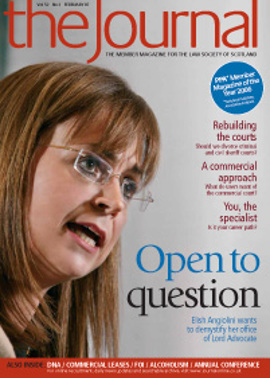Just a winter warmer?

The number of calls to LawCare’s helpline related to alcohol abuse is always proportionally higher in the first few months of the year. In the cold January light of day, it seems that many Christmas and new year revellers start to see their drinking behaviour as rather more sinister than it appeared during the festive season.
Denial is a major part of alcohol addiction, and one which makes it difficult to tackle.
Around one in five people in the UK regularly drink above the recommended safe levels, and around 5% are dependent on alcohol, i.e. they cannot stop drinking without suffering unpleasant and dangerous withdrawal symptoms. Somewhere between these two figures are those for whom alcohol is a problem. They drink despite the difficulties it causes them; they are preoccupied with alcohol; they find it hard to stop at just one or two drinks; and they cannot imagine enjoying themselves without a drink.
Alcoholism is difficult to define, and even more difficult to quantify. At what stage does someone cross the line between heavy drinking and alcoholism, between alcohol abuse and dependency? And once that line is crossed, what hope do they have of recovery?
What the figures tell us
To examine the statistics, it is instructive to look at what happens to 100 imaginary, but typical, alcoholics over a 10 year period. These are people who drink daily, often at inappropriate times, and who have faced criticism at work and at home because of their drinking. Although they will come from all walks of life, a higher percentage will be men, or will be aged 18-30, or will work in unskilled jobs. Don’t get complacent, however. At least one is likely to be a lawyer – 30% of male lawyers and 20% of female lawyers drink to excess.
The good news is that 10 years down the line, 18 of these alcoholics will have recognised their problem and entered inpatient treatment at some point. The cost and length of stay vary with the treatment centre, but the average stay is 10 weeks at a total cost of around £8,000. In about 70% of cases this will be borne by the NHS. It is worth noting that the cost of the treatment centre bears no relation to the likelihood of the treatment being successful.
Of those 18 alcoholics, eight will leave against medical advice before the course of treatment is completed and go back to their old drinking patterns. The remaining 10 will leave treatment and most will continue to attend follow-up or AA meetings. Ten years on, six of them will still be sober and living happy and productive lives, despite a 25% chance that they will have relapsed briefly at least once.
Dead or alive
Six of the remaining 82 alcoholics will attempt to control their drinking through a recognised programme, often a local alcohol service. Two will succeed and will be drinking at normal levels 10 years later. The remaining four may briefly reduce their alcohol intake, but will find that part of being an alcoholic is an inability to control their drinking, and will fail in the attempt, though half will go on to try other methods.
Thirteen of our initial 100 will start attending AA meetings. Of these, eight will attend only a few meetings before dropping out, two will remain sober for several months, and three will continue to attend sufficiently to be completely sober (despite a 40% likelihood of temporary relapse) 10 years later.
Discounting those drinkers who have tried other methods, two of the remainder will recognise their problem and successfully achieve a measure of sobriety through their own efforts, or with the support of family, friends, GP and colleagues.
Ignoring the possible overlap because several of our sample group will try more than one method of recovery, this still leaves 61 who have either not recognised their problem or not addressed it. Denial is typical in alcoholism: the addict insists to themselves and others that there is nothing wrong with their pattern of drinking, even though it may be costing them their health, their family and their career. They will come up with ever more ingenious excuses and ways to attribute their problems to anything but the bottle, holding up alcohol as their solution and saviour.
Fifty seven of our problem drinkers will still be vehemently defending their right to drink 10 years after our start date, despite the fact that many of them will have lost their jobs, families and friends through drinking. Four will have died as a direct result of their addiction, through liver disease, alcohol related cancers, road accidents, falls or house fires. In addition, most can expect their lives to be significantly shorter as related health problems assert themselves in later years.
Alcohol related deaths amongst the legal profession are double the national average. Lawyers as a profession have the highest national mortality rate related to chronic liver disease and other alcohol related diseases.
If you have the nagging feeling that you might be drinking more than other people, then ask yourself which category of alcoholic you will fall into. With effort and help, 10 years from now you have a good chance of having a fulfilling and happy sober life. Without it, you have a 4% chance of being dead.
The chances of recovery are best if the problem is tackled in its early or middle stages; it is a myth that the alcoholic has to reach “rock bottom” first or that they cannot be forced to face up to their problem.
- Have your family members or friends ever commented on your drinking?
- Does it annoy you when they do?
- Do you ever drink in the mornings?
- Are you in the habit of going to the pub for lunch and then not bothering with the “lunch” part?
Or do you know someone who seems to have some or all of these problems?
If so, you or they may be developing a problem. Alcohol is a dangerously addictive drug and it can destroy you and everything you value, remarkably quickly. LawCare can provide, in complete confidence, information about the dangers of alcohol and strategies for recovery. We can even help you to gauge whether you have, or are developing, an alcohol problem.
Everyone has their own way of dealing with the stresses of work and life, but there are good ways and bad ways. We can also help you learn to deal with your stress without using a bottle.
WHEN THE GOING GETS TOUGH
Friday night calls for a couple of stiff gins & tonic and an early night. Sound familiar? There is no getting away from it: being a motivated solicitor is hard work. By the end of the week you have fielded endless telephone calls and enquiries. You have read and digested volumes of paperwork. You have met with clients and applied your mind to the law. Well, here’s hoping.
Most non-commercial clients have no conception that you may be managing a large caseload or, as a court practitioner, you may not always be at your desk. And why should they? Today’s client is paying you for an efficient service and is entitled to expect your attention. However, a balance has to be struck before the hardworking solicitor suffers from an apoplectic fit.
It may sound trite, but managing your client’s expectations is the key to a happier work environment. Yes, there will be clients who will never be happy and sometimes they will be dissatisfied not with the service, but because you have to tell them that their claim is C.R.A.P. – Costly, Risky and Absolute Piffle.
It is our job to deliver this news, and managing expectations at the outset and throughout is critical. You have to assess and advise your client of the risks at an early stage. These are skills that you obtain only through practice.
Sometimes the problem in managing clients’ expectations is more serious.
Firms should recognise that their staff can sometimes be subject to abuse from clients.
It is important to support your work colleagues. A simple discussion can put things into perspective, and you may be able to share useful tips on how to improve the service to your clients.
If you do not feel comfortable talking to a colleague, remember you can always contact LawCare in confidence on its freephone number 0800 279 6888.
Now where is my tin hat…
Kim Leslie, Digby Brown
CASE HISTORY*
James, the managing partner of a medium sized firm, telephoned us with concerns about their assistant, Alastair. He was arriving at work in the morning smelling of alcohol, the quantity and quality of his work was deteriorating, and he was becoming argumentative with other members of the staff. We sent James a copy of our publication “An Alcoholic in the Firm?” He approached Alastair in a supportive manner, indicating that the firm was anxious to keep his services and to ensure his recovery. However it was also made clear that if he was unable to deal with the problem then his future with the firm was likely to be a short one. It was suggested that Alastair should contact LawCare.
After some persuasion he did so. Initially he was in strong denial both of the nature and the extent of the problem. However we put him in touch with one of our local volunteers and were able to persuade him that a sensible first step would be to go to a meeting of Alcoholics Anonymous. The volunteer took him to his first meeting. Within two weeks Alastair had stopped drinking altogether and after two months he returned to work on a structured part-time basis, the amount of time that he put in at the office increasing over the next few weeks. He is now working full time in a fully effective professional manner and the firm is delighted with his progress.
*Steps have been taken to protect the identities of all concerned
LawCare: The Service
LawCare is a confidential, free** advisory service to help lawyers, their staff and immediate families deal with problems which are interfering, or have the potential to interfere, with work performance and/or family life.
The LawCare service takes the form of initial telephone discussion and includes referral where necessary to expert assistance and/or support from a fellow lawyer who has recovered from the same problem.
A wide range of information leaflets is available and LawCare is also happy to make CPD accredited presentations, which are offered free except for expenses.
0800 279 6869
**Any subsequent professional counselling or treatment will normally have to be paid for unless available on NHS or covered by private health insurance.
Trish McLellan is LawCare’s Co-ordinator for Scotland, having previously been in private practice in the north and north-east of England.
In this issue
- Routes to qualification: the Italian picture
- Speaking of change
- Disabled from suing?
- Hearing and answering
- Court afresh
- Clean sheet at the Commercial Court
- Making a specialism pay
- LCN DNA - devil in the detail
- To buy or not to buy?
- Just a winter warmer?
- Views from the new boy
- Working out time
- A claim in trust
- Incapable of dismissal?
- Chasing debts made simple?
- Scottish Solicitors' Discipline Tribunal
- Website reviews
- Book reviews
- FOISA goes to court
- On the wrong track?






